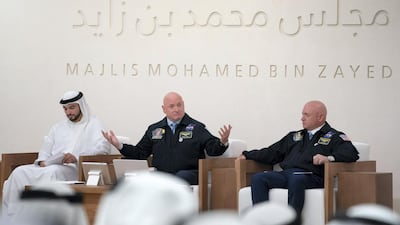History-making astronaut twins Scott and Mark Kelly may have been born just minutes apart - but they didn't even inhabit the same planet for a whole year.
The impressive duo, who were both US Navy captains and have each flown on the Endeavour and Discovery space shuttles and spent time aboard, the International Space Station, broke new ground after agreeing to take part in the enterprising Twins Study, which investigated the effects of space travel on the human body.
While Scott jetted off into space for an entire year, his identical twin remained grounded on planet Earth.
The pair agreed to the remarkable mission to help push the boundaries of scientific discovery further than ever before - and it is an ambitious spirit they see mirrored here in the UAE.
The siblings among the stars shared their incredible out-of-this-world story at a lecture - called The Sky is not the Limit: Life lessons from NASA's Kelly brothers - at the Majlis Mohamed bin Zayed in Abu Dhabi’s Al Bateen Palace.
Th eye-opening lecture as attended by His Highness Sheikh Mohamed bin Zayed, Crown Prince of Abu Dhabi and Deputy Supreme Commander of the UAE Armed Forces, His Highness Sheikh Sheikh Hamdan bin Zayed Al Nahyan and a host of other dignitaries.
Scott Kelly, who struggled at school when he was young, says he was inspired to become 'something greater' and he believes the UAE is on the verge of boldly going where nobody has gone before, too.
The UAE is launching the region's first mission to mars in 2021 and Kelly believes the country is capable of building a city on the red planet, too.
_____________
Read more:
What does it take to get a place on the UAE's first astronaut programme?
Search for the fantastic four: Sheikh Mohammed begins hunt for first Emirati astronauts
_____________
Scott Kelly, who has penned a New York Times best-seller on his life in space, said: "When I was looking through the (UAE) Mars plan and thinking back to when I visited in the late 1990s, and how much your country has changed, I thought the perfect people to be involved in building a city on Mars would be the people who built this incredible city here in a very challenging environment.
Brother Mark added: “We visited the space center where the satellite will be put together I think this is an exciting time for your country to be building a satellite from the ground.
The brothers feel the chance to reach for the stars will have a huge impact on the nation's economic development.
“It is great training for the engineers who will work on that technology; space technology is the most sophisticated type of technology that we do, and don’t underestimate how it motivates young people in science and math; those are really the drivers of highly complex economies," continued Mark.
The UAE has long been looking for ways to involve more young people in scientific fields, and encourage them to choose scientific majors in university.
Scott Kelly spent 340 days on board the International Space Station in 2015 to conduct the NASA Twins Study, to compare the health and physical changes his body would go through, with his twin Mark who stayed on Earth. The goal, also, was to prepare for what could happen to astronauts who fly to Mars.
The study found that Scott’s DNA had not fundamentally changed after a year in space. However, 7 per cent of Scott’s gene expression - which is how our body reacts to our environment - had altered from its pre-flight levels, a change NASA termed "very minimal".
“I did have some effects on my genetics from radiation and the environment, and what changed was the gene expression, in my case 7 percent had change compared to my brother Mark on earth,” Scott explained.
“I feel fine,” he added, “I am not so concerned about this, but the other thing that changes was telomeres, as you get older telomeres get shorter,” as a result Scott started ageing faster.
“That is why I look a lot younger, and he is actually the younger brother,” joked Mark.
Through their space expeditions, the twins collectively carried out dozens of highly advanced scientific research including into bone cancer – another example of the lasting legacy of going to space.
“Science that we do in space today, becomes tomorrow’s technology – that is how important it is,” insists Scott.
“But you’ve got to get there to do that, and getting there is the really hard part,” said his twin.
“When you head out to the launch in space, the space shuttle is really fuelled and nobody wants to be around it anymore because of hazards of liquid acids and hydrogen. It is a very complex vehicle. It is a crazy ride into space, it is wild it is dangerous you feel incredible acceleration,” he described.
“And the best things about it is it is the most fun you have ever had in your life, incredibly exciting, there is nothing like it."


